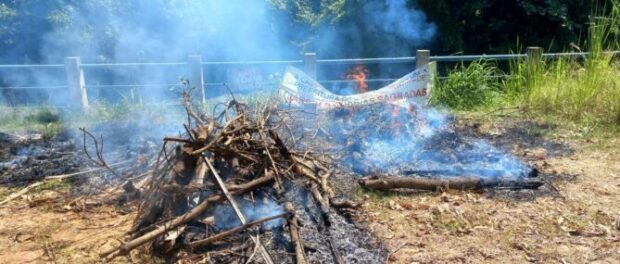
This is our latest article in a series created in partnership with the Behner Stiefel Center for Brazilian Studies at San Diego State University, to produce articles for the Digital Brazil Project on climate impacts and affirmative action in the favelas for RioOnWatch.
It took Heloísa Helena Costa Berto a long time to finally feel at home in Guaratiba. The problem was not the location, but the reason for the move that brought her to the far West Zone of Rio. She is one of hundreds of people who had been forcibly removed from Vila Autódromo in the pre-Olympic period. The Olympic Park was built next to the area occupied by the community until 2016. Today, nothing has been done to the site of Heloísa Helena’s former home. In addition to being her residence, the house also belonged to her orixá (sacred spirit), receiving several practitioners of traditional Afro-Brazilian religions. Heloisa Helena is a candomblé priestess, known as Luizinha de Nanã.
With enormous effort, Luizinha built a new house for her orixá next to her new residence in Guaratiba. She has been living there for six years, but things haven’t completely fallen into place: “I don’t have things settled, I’m still in the construction phase,” she says. Separated by a narrow dirt road, in front of the entrance gate to her house, is the Jardim Piaí Channel, which is polluted by sewage and substantial garbage from the surroundings areas. Since she moved, the pollution of the stream that flows into Praia da Brisa, a mangrove beach, has been a source of great anguish for Luizinha.
“The mangrove is the main element of my mother Nanã, my orixá. I felt indebted, spiritually, to protect the channel. I used to get very offended when people called the channel a ‘valão.’ A valão is a dirty place, a ditch. Then, I started to think: I have to clean the channel, I need to clean the channel,” recalls Luizinha.
To carry out the task, however, she needed support. “When I talked to people about cleaning the channel, they wouldn’t even hear me out. Cleaning the channel is a huge undertaking. ‘Who’s going to want to clean it? What project will accomplish this?,’” they’d ask Luizinha.
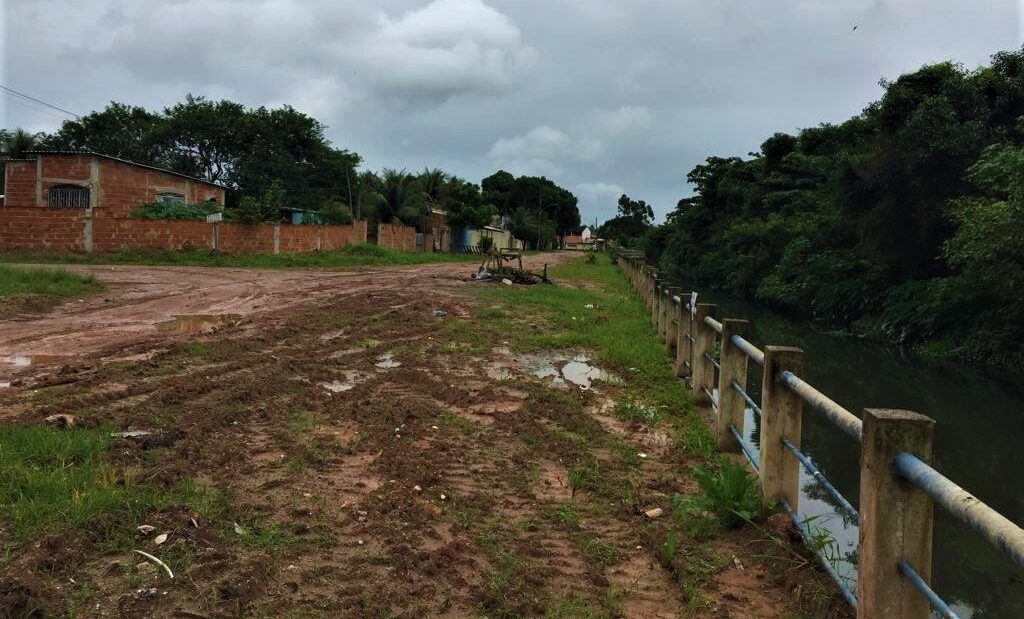
As a member of several networks, including the Sustainable Favela Network* (SFN), Luizinha did not give up and adopted a different strategy to gain support. “I’d participate in every online event they had about the environment, ask for a moment to speak, and share my struggles in relation to the polluted channel. It was just like that, passing the cup,” she jokes. Representatives from the Living Bay Movement and the Oswaldo Cruz Foundation (Fiocruz) were present at one of these events, people who worked directly with actions for water recovery. They embraced Luizinha’s idea and started to support her in her mission to clean up the waterway.

The movement around the idea grew and came to include people from different areas. From this collective came the idea of creating a garden of sacred herbs that, in addition to growing herbs, would use plants to help improve the water quality. There is a protected environmental area on one side of the channel, and a narrow dirt road on the other, where the earth was visibly dry and cracked on the channel’s banks. Recovering the soil would be the first step to building the garden.
Luizinha wanted to do everything by the book, so she wrote a project and proposed it to City Hall:
“Anyone who went through a forced eviction knows the value humans place on the land. People kill for land. So, I approached the City, because that area [the garden] is a public area. I went to City Hall and asked if I could adopt the space, the stretch of land in front of my house and my neighbor’s. I presented the project, they considered everything, and let me adopt the space for two years. After that, we started organizing to plant.”
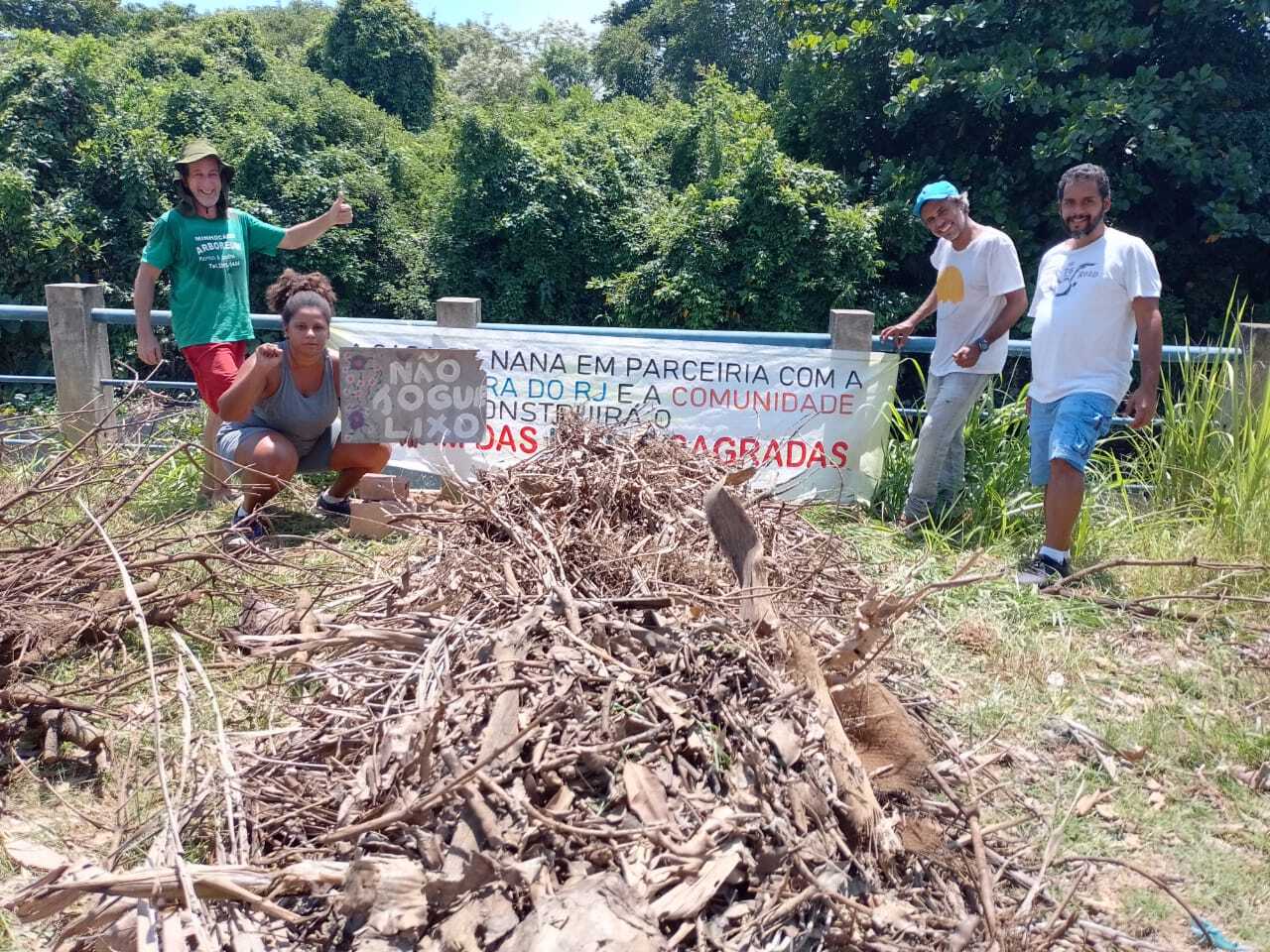
After the papers formalizing permission to care for the space arrived, the first task force was scheduled, which took place on March 5, 2022. “The house was packed,” Luizinha remembers. “Pericres Muniz, a biologist, came from Cachoeiras de Macacu to show us what to do, because this was during the period when the sun was very hot here in Rio. He taught us how to mitigate the sun’s intensity on the ground, and how to start recovering the very dry soil.” The group distributed organic material such as branches, trunks, and dry leaves over the garden beds and, for a few days, Luizinha watered the area daily. “I’d go there every day and water everything. Until, one day, I got there and found everything burned down… They burned everything down!”
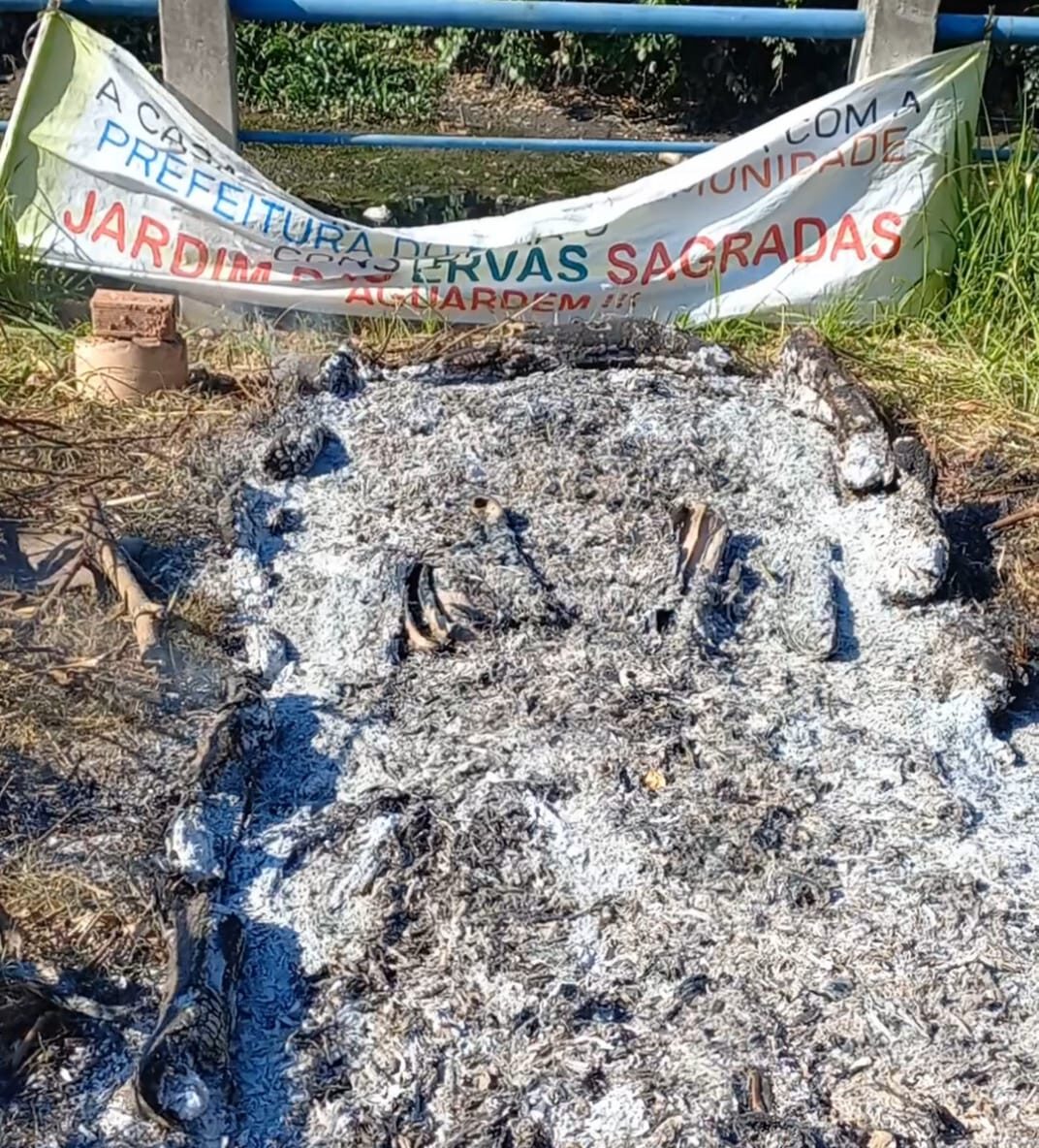
Religious Racism
In the area where the sacred herb garden would have been constructed, there were two large banners with information about the project and those responsible. The fire set to the beds was not accidental. For Luizinha, this is clearly a deliberate attack which constitutes yet another episode of religious racism. This was not the first act of violence she has suffered motivated by religious prejudice. Insults to her religious practice, offensive comments about Candomblé, and even the non-recognition of her chosen name, Luizinha de Nanã, constitute some of the violence she has experienced in everyday life. “Some people here are prejudiced and have already verbalized this to me quite clearly. But I’d been letting it go, I never thought it would come to this,” said Luizinha.
According to the National Human Rights Ombudsman (ONDH) from the Ministry of Women, Family and Human Rights (MMFDH), this year alone, as of March 16, 111 complaints of freedom of belief violations had been filed. This means that the country officially records, on average, three reports of religious intolerance every two days. In 2021, there were 581 complaints, with the highest number (138) recorded in the state of Rio as compared to other states. The complaints, however, show a racial character to the religious attacks occurring in the country, where most of the victims are people and communities linked to religions of African origin. Thus, the violation of freedom of belief in Brazil is closely related to religious racism.
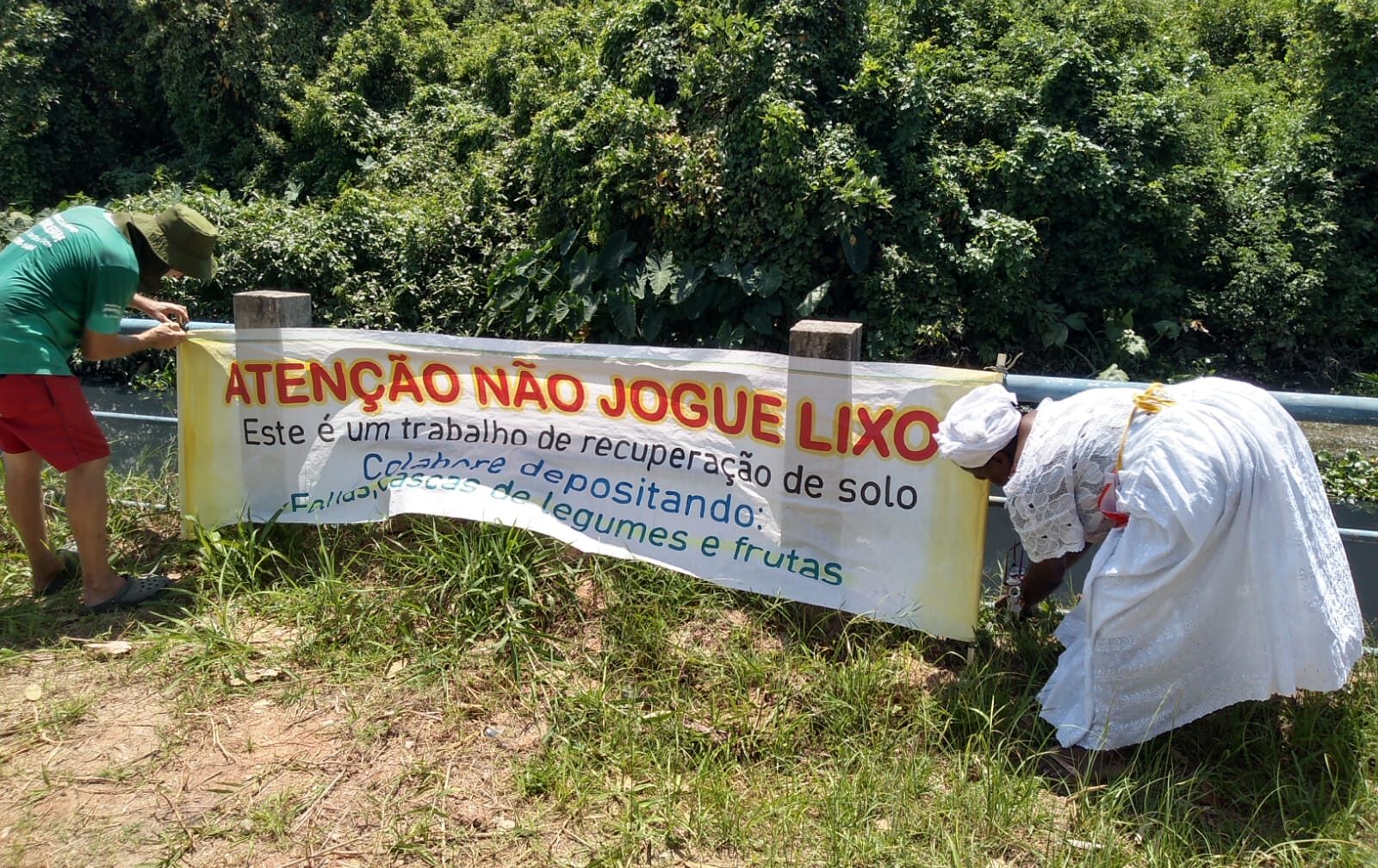
The sacred herb garden was not just a religious project, as Luizinha says. It was, above all, an environmental education and conservation initiative. “Even without fully solving the problem, there are many natural ways to reduce the pollution of a channel, a lake, a pond… There are many ways to do that. We had been looking at plants that we might put at the channel’s edge in order to do these experiments,” explained Luizinha. Using plants to clean water is a common technique. In these instances, plants act as filters, capturing, treating pollutants and returning cleaner water.
The intention was also to influence others and draw attention to the need to care for the region’s natural areas. “The idea is that it would be an inspiring action so that other people could take on similar efforts,” says Luizinha about the garden. “Imagine if others adopted and transformed the land just across from their homes, that they took responsibility for an area and cared for it, planting and cleaning it… How would things be?”
She did not have enough time to reflect and present all these ideas. The first task force to create the beds took place on March 5 and the arson took place six days later, on March 11. A new task force was scheduled for March 17, when people would once again gather to plant and inaugurate the garden of sacred herbs. The event was not canceled, but it took place amid a very different atmosphere than everyone had imagined.
“We went on with the private event, just for us, inside the barracão [the temple itself]. We just wanted to discuss what measures and paths forward we were going to take. Adriana Sotero, from Fiocruz, came and took a sample of the water. She did some sketches of how the garden could help, which part could be planted on and which one could not. But then we were left without a place to work on, in a frustrating situation, in a somewhat hostile climate,” recounts Luizinha.
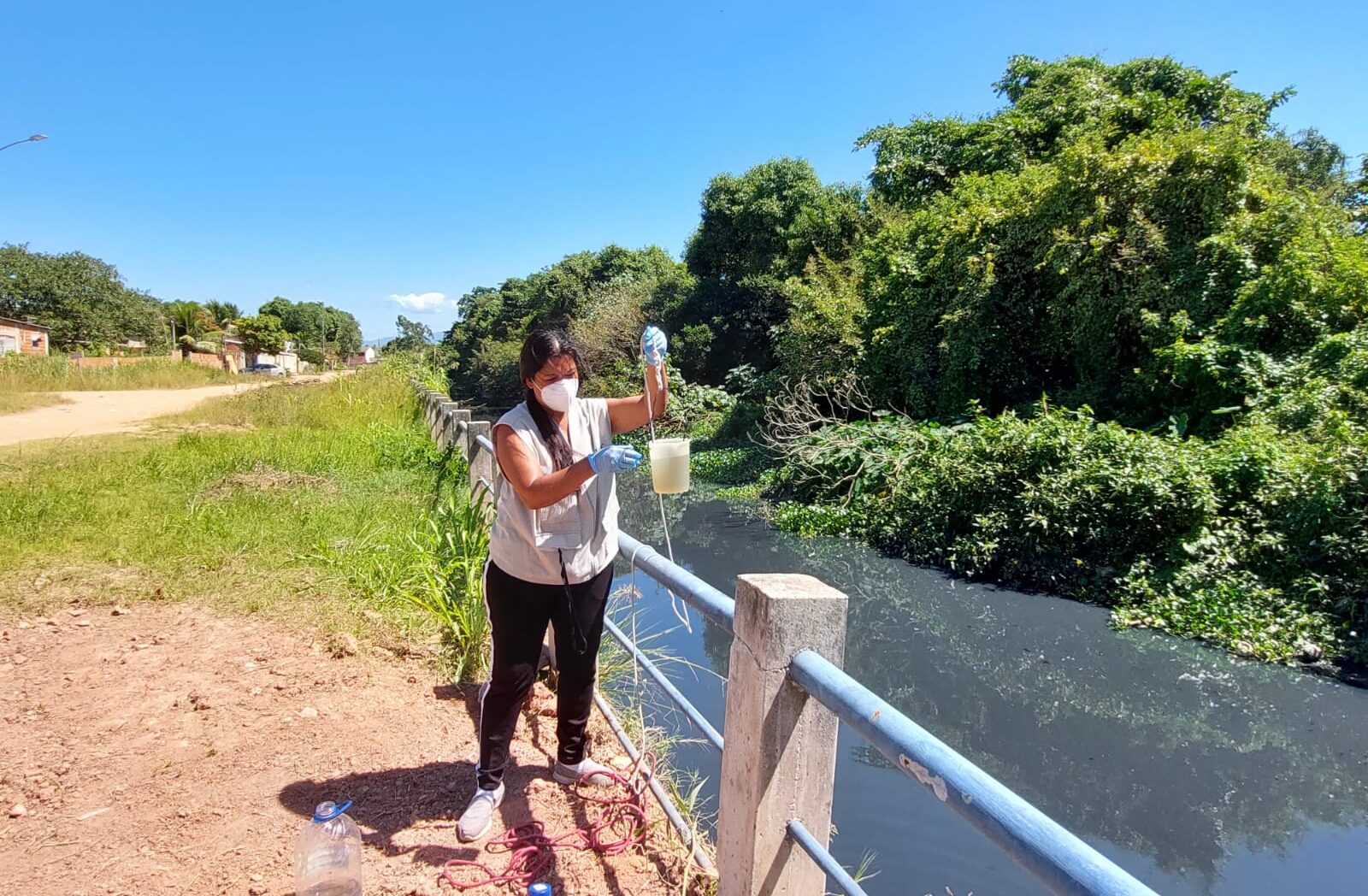
The idea of building a garden persists, but in a new location. The proposal is to bring the project into the temple. The space will be open to people and communities from the surrounding areas and envisioned as an environmental education initiative. However, for now, cleaning and preserving the channel is a paralyzed dream.
Luizinha de Nanã’s Struggle
“Without nature, there is no candomblé,” stated Luizinha in a social media post. Candomblé is an Afro-Brazilian religion based on the Yoruba religions of Nigeria going back about 12,000 years, and as described by her, is “from a time when there was only man and his natural elements.” The gods have always been linked and are still connected with some part of nature. She exemplifies:
“In short, we have Yemanjá, who is the queen of the sea. Then there’s Oshun, who’s from the fresh waters. We have Oya from the rains and storms. Nana Buluku, from the earth and mangroves. Then, we have Shango with thunder. We have Osanyìn, who owns all leaves, and so on… It is precisely because our orixás, who are our gods, are responsible for an element of nature, that we must have great respect for all natural elements, just as we have respect for our orixás.”
Engagement around environmental issues is only one facet of activism for Luizinha, who is internationally recognized as a defender of human rights. She is recognized by Front Line Defenders, a reference organization that works to protect those who defend human rights around the world. In addition to environmental work, Luizinha acts to combat prejudice and discrimination against black communities, in addition to promoting religious freedom and defending her sacred objects.
Since the eviction process in Vila Autódromo, which culminated in her leaving the community in 2016, she has become even more involved in the struggle of black and peripheral populations for the right to land. Today, she works in defense of the quilombos and peoples of the West Zone neighborhoods of Vargem Grande, Vargem Pequena, and Jacarepaguá and beyond in the Baixada Fluminense through the West Zone Solidarity Web. She also participates in the Afroenvironmental Network, an organization for which she will be an ambassador at Rio+30.
Recently, on April 5, Luizinha was awarded the “Mãe Beata de Iemanjá Award” for her contribution to the fight against religious racism in the state of Rio, in recognition of Green April, the month that celebrates the fight against religious racism in the state.
*The Sustainable Favela Network and RioOnWatch are both projects of Catalytic Communities (CatComm).

